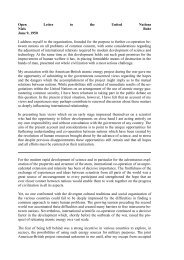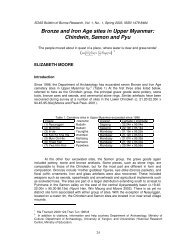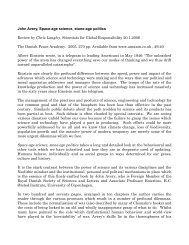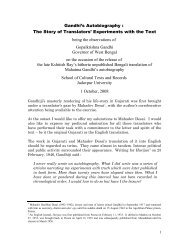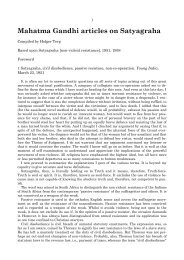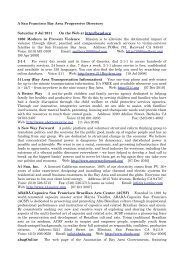THE SLAVERY OF OUR TIMES PREFACE / INTRODUCTION
THE SLAVERY OF OUR TIMES PREFACE / INTRODUCTION
THE SLAVERY OF OUR TIMES PREFACE / INTRODUCTION
You also want an ePaper? Increase the reach of your titles
YUMPU automatically turns print PDFs into web optimized ePapers that Google loves.
These do much and have done much in all ages; but the foundations of society were<br />
never yet shaken as they are at this day.<br />
"It is not that men are ill-fed, but that they have no pleasure in the work by which<br />
they make their bread, and, therefore, look to wealth as the only means of pleasure.<br />
"It is not that men are pained by the scorn of the upper classes, but they cannot<br />
endure their own; for they feel that the kind of labor to which they are condemned is<br />
verily a degrading one, and makes them less than men. Never had the upper classes<br />
so much sympathy with the lower, or charity for them, as they have at this day, and<br />
yet never were they so much hated by them."-From "The Stones of Venice," by John<br />
Ruskin, Vol. II, Chap. VI., §§ 13-16.<br />
CHAPTER I.<br />
GOODS-PORTERS WHO WORK THIRTY-SEVEN H<strong>OUR</strong>S<br />
An acquaintance of mine who works on the Moscow-Kursk Railway as a weigher, in<br />
the course of conversation mentioned to me that the men who load the goods on to his<br />
scales work for thirty-seven hours on end.<br />
Though I had full confidence in the speaker's truthfulness I was unable to believe him.<br />
I thought he was making a mistake, or exaggerating, or that I misunderstood<br />
something.<br />
But the weigher narrated the conditions under which this work is done so exactly that<br />
there was no room left for doubt. He told me that there are two hundred and fifty such<br />
goods-porters at the Kursk station in Moscow. They were all divided into gangs of five<br />
men, and were on piece-work, receiving from one rouble to iR. 15 (say two shillings to<br />
two and fourpence, or forty-eight cents to fifty-six cents) for one thousand poods (over<br />
sixteen tons) of goods received or dispatched.<br />
They come in the morning, work for a day and a night at unloading the trucks, and in<br />
the morning, as soon as the night is ended, they begin to reload, and work on for<br />
another day. So that in two days they get one night's sleep.<br />
Their work consists of unloading and moving bales of seven, eight, and up to ten poods<br />
(say 252, 280 and up to nearly 364 pounds). Two men place the bales on the backs of<br />
the other three who carry them. By such work they earn less than a ruble (two<br />
shillings, or forty-eight cents) a day. They work continually without holiday.<br />
The account given by the weigher was so circumstantial that it was impossible to<br />
doubt it, but, nevertheless, I decided to verify it with my own eyes, and I went to the<br />
goods-station.<br />
Finding my acquaintance at the goods-station, I told him that I had come to see what<br />
he had told me about. "No one I mention it to believes it," said I.<br />
Without replying to me, the weigher called to some one in a shed. "Nikita, come here."





